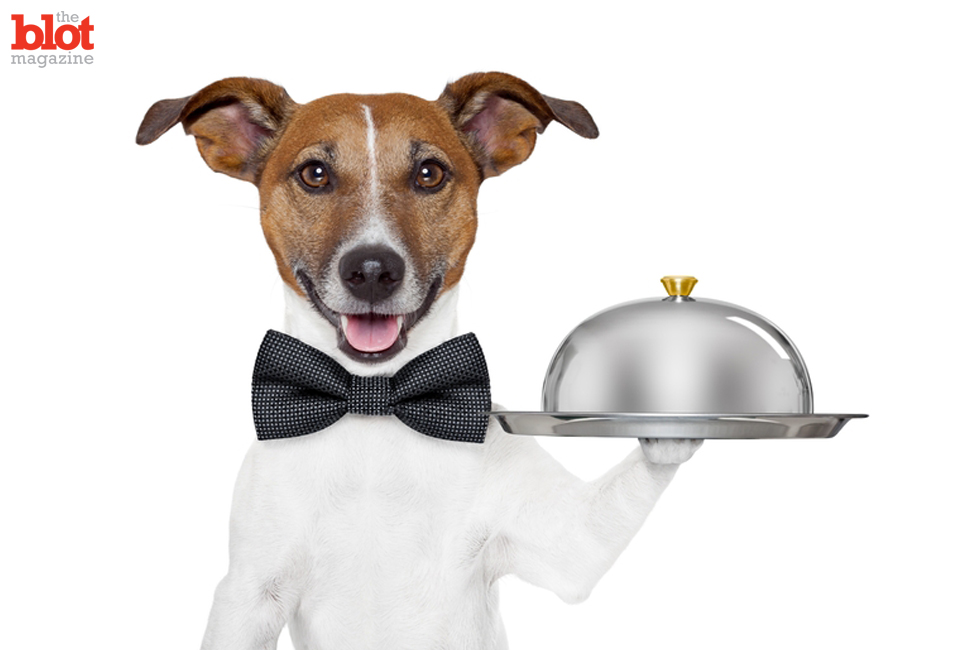My Cavalier King Charles Spaniel, Buddy, is at the tippy-top of every year’s “I give thanks for” list. It’s easy to write out the reasons he rocks my world:
- Buddy stares at me lovingly with big brown eyes like Bambi’s
- He follows me around because he needs to know where I am and what I’m doing every second of every day
- The Budster Velcros himself to me while we’re watching TV or reading
- Whenever I awaken, his little brown-and-white head pops up like a periscope
OK, we could be here all day. Let’s reel me in. I’ll stop there and get back to the topic at hand — which foods are dangerous for your pets to ingest during Thanksgiving and holiday season festivities.
REMEMBER, SIZE DOES MATTER
The smaller the pet and the larger the portion of the food they ingest, the more likely you will have to rush your dog to the emergency room, so don’t take any chances. Be sure that all of your guests, especially children, understand that they are not to give anything to the dog or cat. Many people have no idea what certain foods can do to animals, so here is TheBlot Magazine’s list of the top 10 worst offenders at a Thanksgiving celebration:
TURKEY OR CHICKEN BONES
These are extremely dangerous for your pets because the bones can easily splinter and get stuck in your furry loved one’s gastrointestinal tract. The sharp edges from splintered bones can cause dangerous perforations. An all-too-common choking hazard can occur if a bone becomes lodged in the throat of your dog or cat. Please be careful over the holidays to not leave anything in the kitchen garbage. Pets know how to be sneaky and can easily get into it. Take the garbage outside, tie it and secure it in a covered garbage can far away from Fifi or Fido.
CHOCOLATE
Obviously, chocolate can contain a lot of fat, that is why we get fat when we eat too much of it. Fat isn’t any good for your pets, either. Chocolate also contains methylxanthines, which are stimulants including theobromine and caffeine. Depending on the size of your dog or cat, the amount of chocolate eaten and the type of chocolate (milk, dark or baking), horrid things can happen. Your pet may experience vomiting, diarrhea, tremors, irregular heart beat, seizures and even death. Their little pancreas can become inflamed causing pancreatitis, which can be fatal. Four ounces of milk chocolate — or merely half an ounce of baking chocolate — can seriously harm a 10-pound pet.
XYLITOL
This sugar substitute is often found in candy, gum or other packaged foods and even in toothpaste. If your dog or cat ingests as little as an eighth of a teaspoon of xylitol, it can cause pancreas to secrete insulin, which can lead to dangerously low blood sugar. Ingesting half a teaspoon could lead to liver damage or even liver failure. Symptoms include vomiting, loss of muscle control, lethargy and seizures. Liver failure can occur quickly. Rush your pet to the animal hospital.
GRAPES OR RAISINS
Did you know that your dog or cat could become extremely sick just by eating a handful of grapes or raisins? Nobody knows exactly why because the poisonous substance has never been identified, but even in small amounts, grapes or raisins can cause acute renal failure, and your beloved fur-baby could die. Don’t take a chance. Symptoms of a toxic reaction include diarrhea, excessive thirst, urinating excessively or not at all and lethargy. There is no antidote. Get your pet to a hospital immediately.
ALCOHOL
What you may perceive as only a smidgeon of alcohol can poison your pets. It’s very common for drinks to be left unattended at a holiday gathering, and your pet could easily be attracted by the smell of liquid in a glass, especially if it’s a sweet cocktail. Don’t leave open bottles on counters, either, and remember that many other foods — like rum cake or wine sauce — can contain enough liquor to put your dog or cat in danger. Alcohol poisoning can cause liver and brain damage. Just two teaspoons of whiskey can cause a coma in a five-pound pet; three teaspoons could kill. Obviously, the higher the alcohol proof the more damage it can cause.
DAIRY PRODUCTS
Most cats are lactose intolerant. Dogs can be, too. Lactose is made up of two sugar molecules. For a dog or cat to digest foods that contain lactose, their bodies must contain lactase, an enzyme that can split up the two sugars and make them digestible. Without lactase, your pets’ system cannot digest dairy foods containing lactose. Signs of upset include vomiting, gas and diarrhea.
MACADAMIA NUTS & WALNUTS
Macadamia nuts can cause toxicosis. Symptoms usually occur within 12 hours of ingestion and last for approximately 12 to 48 hours. Your poor little doggie can experience vomiting, tremors, increased heart rate, fever, hypothermia and even become unable to stand. Although uncommon, it can lead to death.
ONIONS, GARLIC, SAGE, NUTMEG
Onions and garlic contain sulfides, which can damage red blood cells. Too much of one of these taste enhancers can cause toxic anemia. Days can go by before you notice a problem. This warning includes all forms of onion: powdered, raw, cooked, dehydrated, leeks, scallions and chives. Nutmeg can cause seizures. Sage and other herbs have oils that can cause stomach pain and/or affect a pet’s central nervous system. Cats are especially sensitive to sage.
CAFFEINATED COFFEE, TEA & SODA
Caffeine can harm your dog or cat. It can cause heart palpitations, rapid breathing and muscle tremors. In large quantities, it can cause death. Caffeine is also in some cold medicines and pain relievers, but I’m sure you already know that any medicine for humans, even over-the-counter stuff, can kill animals. That’s why there are warning signs all over the packaging and many medicines come with safety caps. So, as Judge Judy loves to say, “Don’t be stupid.”
THE MAKINGS OF THE MEAL
The kitchen is one big danger zone. While you are preparing your holiday meals, keep the following big offenders in mind. Uncooked eggs can cause salmonella poisoning or E. coli infection. Yeast dough is an extreme hazard. The uncooked dough can rise, and while it is expanding in your pet’s stomach, it can cause dangerous distress. If you abandon the kitchen to join your guests, do not leave any of these things accessible to your pet: fat trimmings, gravy, rich sauces, aluminum foil, plastic wrap, turkey cloth, wax paper, batter, spoons, toothpicks — all of these can be swallowed and can cause consequences that are too terrifying to even think about. Just don’t do it.
One last note: No matter how careful you are things can go wrong. It’s important to keep phone numbers on auto dial for your vet, the local 24-hour animal hospital, and ASPCA’s Animal and Poison Control Center: 888.426.4435.
Now that you are armed with info, have a safe and happy holiday season!
Dorri Olds is a contributing journalist for TheBlot Magazine.







One Comment
Leave a Reply